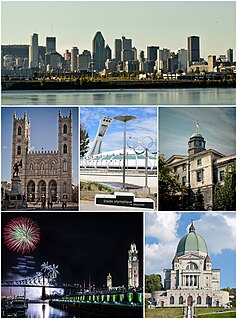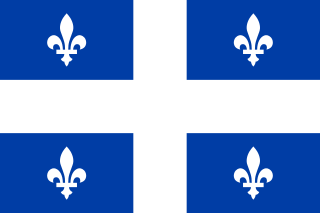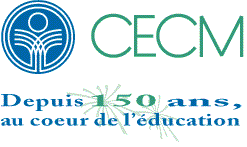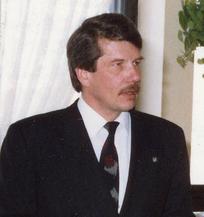Alliance Quebec (AQ) was a group formed in 1982 to lobby on behalf of English-speaking Quebecers in the province of Quebec, Canada. It began as an umbrella group of many English-speaking organizations and institutions in the province, with approximately 15,000 members. At its height in the mid-1980s, the group had a network of affiliated anglophone groups throughout the province. However, a prolonged decline in influence, group cohesion, membership and funding ultimately led to its closure in 2005.

English Montreal School Board is one of the 5 school boards in the island of Montreal. The EMSB is the largest anglophone school board of 9 in Quebec.

With access to six universities and twelve junior colleges in an 8 kilometer (5 mi) radius, Montreal, Quebec (Canada) has the highest proportion of post-secondary students of all major cities in North America. This represents roughly 248,000 post-secondary students, one of the largest numbers in the world.
Protestant School Board of Greater Montreal was a Protestant and predominantly English-language school district in Montreal, Quebec, Canada which was founded in 1951 as a replacement for the Montreal Protestant Central Board, and ceased operations in 1998, with most of its assets transferred to the new English Montreal School Board. Quebec's Protestant school boards served all non-Catholics, so that the city's Jewish students generally attended schools operated by the PSBGM. The PSBGM's headquarters was located at 6000 Fielding Avenue in Montreal, which is now the headquarters for the English Montreal School Board.
The governing Quebec Liberal Party fielded a full slate of 125 candidates in the 1994 Quebec general election and elected forty-seven candidates, falling to official opposition status in the National Assembly of Quebec.
Domenico Moschella, also known as Dominic Moschella, was a politician in Montreal, Quebec, Canada. He served on the Montreal City Council from 2013 to 2015, representing Saint-Léonard-Est as a member of Coalition Montréal.
Action Montreal was a short-lived municipal political party in Montreal, Quebec, Canada, that existed from February to April 1994 under the leadership of entrepreneur Claude Beauchamp.
Dominic Perri is a politician in Montreal, Quebec, Canada. He has served on the Montreal city council since January 1, 2002, and was a member of the Saint-Leonard city council and chair of the Commission scolaire Jérôme-Le Royer.
Lyn Thériault, formerly known as Lyn Faust, is a politician in Montreal, Quebec, Canada. She has served on the Montreal city council since 2001 as a member of the Vision Montreal party. She was also an elected member of the Commission scolaire de Montréal from 1998 to 2007.
The Regroupement scolaire confessionnel (RSC) was a political party in the educational system of Montreal, Quebec, Canada, from 1990 to 2003. The party governed the Montreal Catholic School Commission (MCSC) from 1990 to 1998 and later formed the official opposition on the successor Commission scolaire de Montréal (CSDM).
The Collectif pour la réussite et l'épanouissement de l'enfant (CRÉE) was a short-lived political party in the educational system of Montreal, Quebec, Canada. It contested the 2003 school commission elections for the Commission scolaire de Montréal (CSM), the primary francophone board in Montreal, and saw three of its candidates elected.

Diane De Courcy is a Canadian politician. She was a Parti Québécois member of the National Assembly of Quebec for the riding of Crémazie from 2012 to 2014, first elected in the 2012 election.
Jacqueline Montpetit is a politician in Montreal, Quebec, Canada. She served on the Montreal city council from 2001 to 2009 and was borough mayor of Le Sud-Ouest. Montpetit has also served as a school commissioner.
Luc Larivée was a physician and politician in Montreal, Quebec, Canada. He chaired the Montreal Catholic School Commission (MCSC) from 1976 to 1983 and served for many years on the Montreal city council.
Guy Bisaillon was a Canadian politician. Bisaillon served in the National Assembly of Quebec from 1976 to 1985, initially as a member of the Parti Québécois (PQ) and later as an independent.
Jean-Guy Deschamps is a former politician in Montreal, Quebec, Canada. He served on the Montreal city council from 1994 to 2001 as a member of Vision Montreal and was also an elected commissioner on the Montreal Catholic School Commission (MCSC) from 1977 to 1994.

John Ciaccia was an Italian-born Canadian politician who was provincial cabinet minister from Montreal, Quebec. Ciaccia served as a member of Quebec’s National Assembly from 1973 to 1998, representing the Mount Royal riding for the Quebec Liberal Party. He occupied various posts in the cabinets of Liberal premiers Robert Bourassa, and Daniel Johnson Jr, such as minister of Energy and Natural Resources, International Affairs, Native Affairs, and Immigration and Cultural Communities. At the time of his resignation, Ciaccia was the longest serving member of the Assembly. Ciaccia gained international attention for his efforts in negotiating the end of the Oka Crisis alongside his federal counterpart Tom Siddon in 1990. Former Quebec Premier, Jean Charest described Ciaccia's political career as having, "...revolutionized relations with the native people and cultural communities of Quebec by always favouring an approach marked by respect."
Marcel Parent is a retired politician in Montreal, Quebec, Canada. He was chair of the Montreal Catholic School Commission (MCSC) from 1983 to 1984, a Liberal member of the National Assembly of Quebec from 1984 to 1998, and a member of the Montreal city council from 2001 to 2009.











